To learn about “Artificial Intelligence Business Opportunities” we have to read following.
Business Opportunities in AI for 2025………..
Intro to AI Business Opportunities:
In this day and age, artificial intelligence (AI) is an integral part of any business and is revolutionizing the way industries work with new opportunities to grow and innovate as well. With AI, companies of any size can benefit from ML, more sophisticated data processing and automation, to optimize processes, increase efficiency and reduce expenses. Moreover, AI empowers companies to offer personalized and exceptional customer experiences which continues to keep them ahead of the competition. So, if you are an entrepreneur looking to use AI through the lens of your own business and how they can strategically suss out these tools for future success and long-term sustainability, this article outlines some of the most attractive AI business opportunities that are currently in front of us.
Most importantly, Artificial Intelligence Business Opportunities are so useful now a days, moreover Ecommerce-limitless-artificial-intelligence as well.
The Reason Behind AI Revolutionizing Business:
It is the ability of artificial intelligence (AI) to quickly and always accurately crunch data at scale that carries its transformational potential. This enables businesses to base educated decisions, foresee market changes and predict trends correctly. The use of AI in business helps business owners to optimize processes, increase the efficiency of work and be able to offer better customer engagement through personalized experiences. AI, powered by machine learning, becomes adaptive which means its capability of learning from data trends and also continuously improving over time; this is vital for strategy planning and also the operational management. This competitive advantage, in turn, is fueling the increasing dependence on artificial intelligence.
The uses of AI in business process:
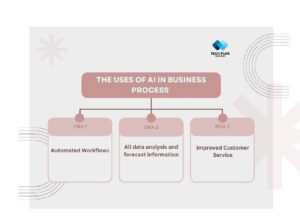
/ The uses of AI in business process-Background
AI-enabled applications are revolutionizing diverse aspects of business, delivering functionality that is not feasible without human speed and precision- from quicker and more precise transcription, to a new breed of security tools. Such applications comprise, but are not limited to, automated customer services with chatbots and virtual assistants, predictive analytics for more insightful calculations and targeted marketing. In manufacturing, AI will augment quality control while in supply chain management it can make things easier; financial services too deploy AI to help with risk assessment and fraud detection ability. In conclusion, AI fuels innovation, productivity and competitiveness in modern enterprise. These applications include:
1. Automated Workflows:
AI powered software improves business performance by eliminating repetitive and time consuming tasks such data migration, appointment scheduling, document management etc. It helps employees a lot by minimizing the amount of work to be done, also in turn alleviating them from repetitive tasks and allowing them more time to invest energy on higher-order work. This enables organisations to tap into their employees creative, critical and problem-solving skills. This transition not only improves satisfaction within the job but also raises productivity and benefits the overall efficiency of the organization.
2. All data analysis and forecast information:
These AI tools can analyze huge datasets to find hidden patterns, forecast future trends, and recommend what actions to take. Using complex algorithms, these tools enable businesses to predict important events like market developments or changes in customer buying patterns. For example, To predict what their future consumers expects, to prepare them on product or service. The proactive nature of leading data companies keeps them on their toes when it comes to competition, consumer expectations and long-term growth sustainability.
3. Improved Customer Service:
Chatbots and Virtual Assistants powered by AI provide contactless customer outreach, immediate assistance with solutions tailored to their particular needs. These tools are integrated with machine learning abilities that allow them to study and learn from past experiences, allowing for tunable responses. By learning over time, chatbots become more efficient and accurate in responding to the customer needs thus increasing user experience. Such iterative learning enables enterprises to observe high customer satisfaction consistently, shorten response cycles, and have human agents focus on higher-order tasks.
Technology Entrepreneurs: The best AI business ideas you should consider:
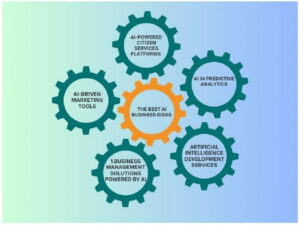
/ AI BUSINESS STRAT UP-Background
With this transformation of AI making the world more and more apparent across sectors, entrepreneurs looking to seize on the revolution have innumerable opportunities. The most lucrative AI business ideas for 2025 include tools for personalized customer experiences, predictive analytics for businesses, AI-driven cybersecurity solutions, smart home automation technologies and innovative healthcare diagnostics. These examples demonstrate the power of AI to enable growth, increase efficiencies and provide a competitive advantage in nascent markets. These are Some of the Most Promising AI Business Ideas for 2025:
1. AI-Powered Citizen Services Platforms:
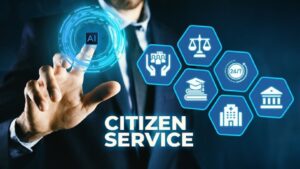
/ AI-Powered Citizen Services Platforms-Background
Creating AI-powered customer support portals is a very great business. These next-generation, industry-leading platforms are able to handle customer inquiries, complaints and support tickets more effectively than traditional call centers. AI-driven systems running 24/7 are designed to engage with customers without any downtime. The only thing that differentiates them is the machine learning ability which can analyze and learn from every interaction. Doing this results in improved problem solving after time, eventually allowing them to deliver more personalized yet efficient solutions that assist in increasing customer satisfaction.
2. AI-Driven Marketing Tools:
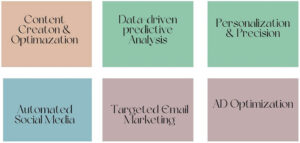
/ AI-Driven Marketing Tools-Background
Transforming Marketing With AI Few fields are data-driven like marketing, and this power has been made possible through AI. The marketing tools that are AI-powered can analyze a huge amount of user data, track complex consumer behavior patterns, and predict future purchasing trends with high precision. There is massive scope for entrepreneurs to come up with innovative AI-driven software programs that will help businesses develop oodles of hyper-personalized marketing campaigns. Such focused approaches not only attract customers but also improve conversion rates and customer loyalty which increase business in the long run giving a competitive edge to the businesses in the market.
3. Business Management Solutions Powered by AI:
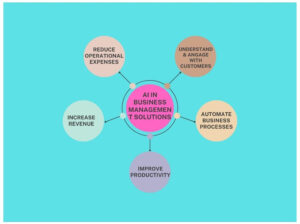
/ Business Management Solutions Powered by AI-Background
Business management tools based on AI are designed to fundamentally change their working style, simplifying the process which needs complexity. These tools can be used to automate all of the important functions like scheduling, task management and tracking performance of employees. AI algorithms, for instance, can identify the criticality and priority of a task in order to prioritize workloads ensuring that resources are allocated most efficiently and deadlines are met regularly. It translates to higher productivity, less human error and effective workflow management. Businesses can use AI to improve collaboration, facilitate project management and keep a cash insert in operation maintaining the line that allows managers and employees to concentrate on planning together with value-added processes.
4. Artificial Intelligence Development Services:

/ Artificial Intelligence Development Services-Background
Companies that adapt AI for product development get a massively competitive edge. AI can find gaps in the market by analyzing consumer feedback, purchasing patterns and competitor strategies through advanced data analysis. Such insight allows companies to develop products that better cater to the demand in the market. Entrepreneurs can provide consultancy services related to AI, helping companies use these functionalities for innovating products. Such consultancy not only brings in expert implementation but also aids organizations in converting AI-driven intelligence into pertinent actions that carve out new products and jump the queue for forging ahead of industry alpha competitors.
5. AI in Predictive Analytics:
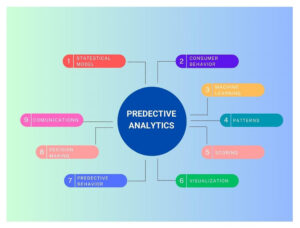
/ AI in Predictive Analytics-Background
Another artificial intelligence use case is predictive analytics, which uses AI algorithms to analyze past data and predict the future value for industries. In the finance world, this technology is used to examine risks created by probable financial crises. For example, predictive analytics aids in demand forecasting for retail which results in appropriate quantities of inventories and an improved customer experience. Health care providers use it for predicting patient outcomes, anticipating treatment, and performing the management of a patient. As industries around the world are finding it increasingly essential to take decisions based on data analysis and insights, you can also consider establishing a business with predictive analytics services that can provide insights-based solutions to improve operational efficiencies by using them for strategic planning in several verticals.
The Future of Business Growth with AI:
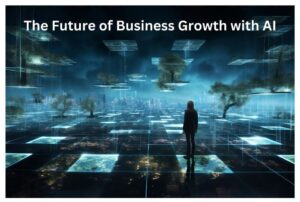
/ The Future of Business Growth with AI-Background
With innovations that will revolutionize almost every business, the future of AI in business looks very bright. AI technologies are only going to continue improving, and as such will better mesh into the strategic plan of businesses, changing operational processes across industries. The ones who proactively adopt AI will find themselves at an advantage, resulting in a higher productivity and efficiency rate. The resale of benefits range from automation, data analysis to personalized customer experiences which translate into meaningful cost savings and optimized decision-making. AI prediction will keep on tending to the optimization chain and incredible customer satisfaction early in that cycle, giving businesses everything necessary to satisfy the degree of expectations in an extremely developing business climate.
What AI Means For My Business:
AI provides various advantages to businesses, such as the automation of menial jobs and improving overall enterprise functionality. This simplifies the operations with where you do not have to enter data, answer customer queries and manage your inventory as it is all done through this platform so you can free up more resources for strategic activities. Furthermore, AI furnishes decision-making with data analytics allowing businesses to forecast demand, tailor offerings, and streamline processes which correlate with cost savings, improved productivity and greater top-line growth. Here’s how:
A. Operational Efficiency:
By automating these mundane tasks, employees are freed from repetitive tasks that consume so much of their time which they can utilise to drive higher value projects falling in the domain of strategy, creativity and problem-solving. This change not only improves job satisfaction but also positive effect on productivity. Automation can enable the workforce potential to drive innovation and growth.
B. Natural Language Processing and Understanding (NLP/NLU):
Advanced Data analysis conducted by AI solutions allows to know what would the customers want, thus providing some personalized interactions. Businesses can modify the catering and develop experiences depending on the genuine experiences of customers based on needs, which generate added value. Such a customized strategy enhances customer satisfaction and creates long-term loyalty in turn, resulting in an overall solid relationship between businesses and customers.
C. Scalability:
AI tools help in gradual automation of redundant tasks with processes requiring complex data interpretation acting as a checklist for business to take notes. It also helps in scaling operations without the need of proportionate addition of people or resources. AI enables businesses to do more with less, in terms of overhead and core operations cost.
Top Small-Business AI Solutions:
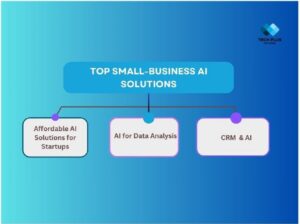
/ Top Small-Business AI Solutions-Background
The opportunity for small businesses to leverage AI for greater efficiency, lowered expenses, and improved customer experiences Small business owners, on the other hand, have access to affordable and scalable AI solutions that enable them to automate repetitive daily tasks such as data entry, customer support, and inventory management. AI powered tools can also offer analytics by paying attention to trends and consumer behavior which will help in better decision making. Besides that, personalised marketing and AI chatbots can enhance customer satisfaction as well as loyalty. With these technologies, small businesses are able to compete and scale with unprecedent effectiveness and without spending many resources. Here Is How Small Business Owners Can Gain An Edge from AI:
1.Affordable AI Solutions for Startups:
Chatbots, automated email responders and scheduling assistants are low-cost AI solutions that enable small businesses to optimize functions in their business without paying through their nose for competitive advantage. They effectively manage inquiries, simple task automation, and appointments gaining time savings and less overheads.The tools are easy to implement in existing systems (few technical details, initial adjustments) with low demand for training. Affordable, immediate-return solutions allow small businesses to grow and innovate without worrying about hitting their budgets through increased customer engagement and operational efficiency.
2. AI for Data Analysis:
Irrespective of their size, small businesses receive some critical information from customer interaction record, sales transaction and website activity record. This is where AI tools can come into the picture — As these repetitive processes generate a lot of data, AI too could process this large database and find what we normally would miss. This enables businesses to customize marketing initiatives, shape suitable products and develop effective sales. Using AI data processing, small businesses can save time and resources while making sound decisions regarding customer experience as well as growth opportunities. This capability levels the playing field between small enterprises and larger competitors.
3. CRM (Customer Relationship Management) & AI:
These AI-driven Customer Relationship Management (CRM) platforms allow businesses to find and track customer interactions, identify growth opportunities, and build better connections with their customers. Such tools slice and dice the customer data available to draw actionable insights thereby enabling businesses to customize their strategies as per client needs. AI-enhanced CRMs automate time-consuming tasks like data entry, appointment scheduling and follow-up reminders, leading to less errors with more efficient work. It helps business owners developed better relations and customer satisfaction to automate their processes making them grow efficiently.
Opportunities of AI and Effects:
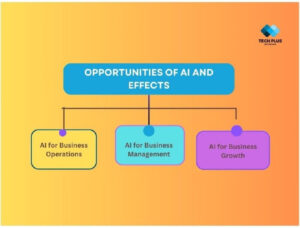
/ Opportunities of AI and Effects-Background
AI + Business process: Together they change the way how businesses function in terms of significant efficiency, accuracy, and scalability. AI directly automates processes, analyzes immense datasets to detect actionable insights for business success, and — via predictive analytics — improves decision-making. It facilitates processes, allows personalized customer engagement and drives innovation across sectors. AI translates operational efficiency and cost reduction into responsiveness for businesses in an ever-changing market, propelling sustainable growth, enhanced competitiveness, and resilience. Business Process Automation with AI The business impact of integrating AI into these processes is very extensive. AI’s integration into business processes has far-reaching impacts:
A. AI for Business Operations:
The capability of AI to automate mundane tasks with precision, reduces human errors and increases accuracy in daily tasks. The automation greatly increases productivity by enabling employees to spend more time on strategic and creative tasks. It translates to enhanced efficiency, performance, desired processes and cost benefits for businesses achieved through the outcomes.
B. AI for Business Management:
It explains how AI aids managers in determining the best use of resources or identifying the sequence of tasks that need to be done by studying data so that teams work efficiently. Managers get to view potential bottlenecks, plan for the associated workload and set achievable deadlines. AI enables the improvement of project workflows, making certain all things are done by deadlines and a budget This optimizes full efficiency and operational success. Support that enables managers to make choices and meet their commitments for the business.
C. AI for Business Growth:
Predictive analytics helps businesses to identify trends and shifts in the market well before they happen, AI-driven insights. AI aids in predicting more accurately by drawing from past data and patterns, so businesses keep proactive to course adjust. This foresight, in turn, can improve decision-making with staying-power relevance, offer new opportunities on a silver platter and allow companies to fortify their market place presence through constant traction to an execution-oriented thought process leading up to growth and sustainability amidst stiff competition.
FAQs About AI and Business:
Q: How does AI get put to use in business nowadays?
A: By doing so, it saves you time spent on repetitive tasks and allows for more meaningful work. Through chatbots and personalization, AI also enhances customer service. And also, it allows data analysis in-depth and gives strategic insights that shape up their decision-making processes.
Q: How can small businesses benefit from AI?
A:With respect to daily operations, AI makes inroads into automation of time-consuming tasks and thereby gives small businesses more time to focus on their growth such as– scheduling, inventory management and customer support etc. This revolutionizes marketing strategies with customer data analysis and campaign personalization. AI also serves to gain ground without spending much as it offers insights for the business decision-making process.
Q:How can AI help small businesses with daily operations?
A: Advanced AI tools will be assistant level and embedded into business workflows for efficient operation. These tools will automate complicated tasks, funnel massive amounts of data in real time, and present actionable insights. This will allow businesses to make better informed decisions resulting in an increase in accuracy and optimization of the overall operations.
Q: In what ways can AI make business operations better?
A: Artificial intelligence takes over repetitive human tasks such as data entry, scheduling and other mundane activities where there is less room for creativity, lowering manual inputs in the workplace. His scope is also about eliminating human error. In addition, it speeds up data processing and helps businesses analyze large amounts of information in a short time. This allows businesses to operate much more efficiently, reliably and make better decisions in every area of the business.
Conclusion:
For companies that want to keep up in a fast-paced, competitive landscape, or for leaders looking to lead effective transformational initiatives there is simply no substitute for making use of AI. With AI-driven solutions, organizations are able to automate certain repetitive tasks that otherwise may require an individual’s involvement — thus streamlining operations and lowering costs. Personalised experiences, predictive analytics and AI-enabled CRMs can boost customer engagement, strengthen company-client relationships. Moreover, AI-powered tools such as automated customer service enhance responsiveness and satisfaction. The usages are numerous, with an endless opportunity for expansion and idea creation. Organizations adopting AI will still be more agile and able to outsmart their competition or define the future of their industry for years to come.
